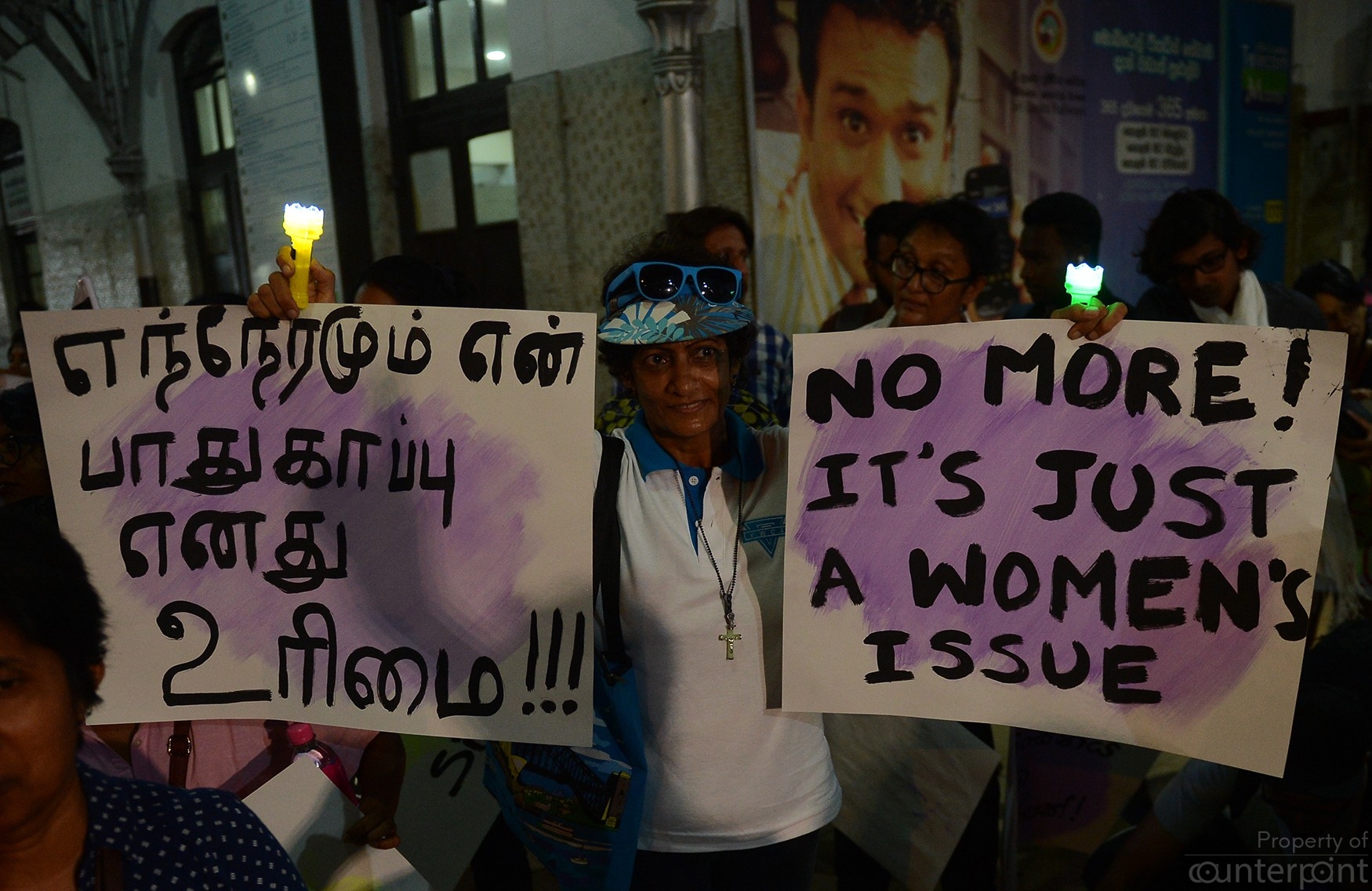When a group of women and like-minded men engaged in a walk from the Fort Railway station to the Galle Face Green on Monday, March 5th, it was to make the point that not just streets, but homes and all other places must be safe for women.
The Walk, organized by the Women’s Education and Research Centre along with the Ministry of Women and Child Affairs called for “Safe Nights, Safe Streets & Safe Homes for Women.”
Even though we have created the space for girls to have equal access to education as boys, and have seen some women reach the top in their chosen areas of study and professions, the ground reality is that there is continued violence, harassment and discriminatory practices against women.

On the one hand, we have the Women’s Charter approved in 1993 which seeks to empower women, and the five year Policy Framework and National Plan of Action to address Sexual & Gender Based Violence (SGBV) unveiled in 2016 by the Ministry of Women and Child Affairs together with the UNDP to end and prevent aggression. The Domestic Violence Act of 2005 is another such tool to assist women who face various forms of harassment and deter aggressors.
However, none of these initiatives appear to be effective enough, as everyday acts and behaviours as well as studies show the opposite.
When the government made a 25% mandatory allocation for women in Local Government it was a step in the right direction. However, several women contestants, particularly those in rural areas were subject to many forms of violence and harassment in a bid to have them withdraw their nominations and supress their right to contest elections on an equal footing with men. The perpetrators included religious leaders.
Many religious bodies, in particular the Catholic Church in Sri Lanka have been leading the charge against the government’s plans to legalise abortion in some limited situations such as rape or severe congenital abnormalities. The government’s aim is to ensure women have access to safe medical intervention if they require it. While opponents promote the need to protect the life of the unborn, they ignore the right of the mother, (often young underage girls) to live and work in an environment that is free from male aggression.

Then we have the ban on alcohol for women. A little known or perhaps forgotten law introduced in 1979 prohibits the sale of any type of liquor to women. An attempt by the then Finance Minister, Mangala Samaraweera to rectify the matter in January this year, saw an immediate order by President Maithripala Sirisena blocking the move. His order was seen by conservative sections of the population who believe women drinking alcohol is an assault on our “cultural identity” and one that would also destroy family values, instead as another reiteration of the dominant role of the man to control a woman’s right to live as she pleases.
“Gender based violence is violence that is directed against a woman because she is a woman or that affects women disproportionately. It includes acts that inflict physical, mental or sexual harm or suffering, threats of such acts, coercion and other deprivations of liberty, states the Committee set up by the Convention on the Elimination of All Forms of Discrimination Against Women.
In a culture where, despite the many provisions introduced to safeguard women, even the President of the country seeks to regulate and stereotype the role and place a woman has in society, it is no surprise that violent acts against women and girls continue to occur.
In the period between January 1st, and December 31st, 2017, country wide statistics in the Grave Crimes Abstract of the Police Department shows 294 cases of rape of women over the age of 16, while statutory rape (under 16 years old) with the consent of the victim stands at 1206. The number of statutory rape cases without the consent of the victim is recorded as 232.

More unsettling news was revealed on Monday, March 5th in Colombo, where a study on the gender perspective of unnatural deaths (caused by external injuries, trauma or poisoning, where the reason could be suicidal, homicidal, accidental or not determined), revealed that one-third of female homicides were related to intimate partner violence. The study, conducted by the University of Kelaniya in conjunction with the UNFPA focussed on five provinces, found that 69% of the cases go unreported and that the leading cause for hospitalization is physical trauma. The legal husband was found to be the perpetrator in a 128 cases of the 243 homicides reviewed in this three year study.
Even though sexual harassment is listed as a crime under the Penal Code, women continue to be pestered in public areas and workplaces.
We’ve got policies and regulations, though they must be more stringently applied if we are too see an end to violence and harassment of females.
The need of the hour is an aggressive awareness campaign that will end patriarchal attitudes, and create a society that treats women not as commodities, but as human beings.





